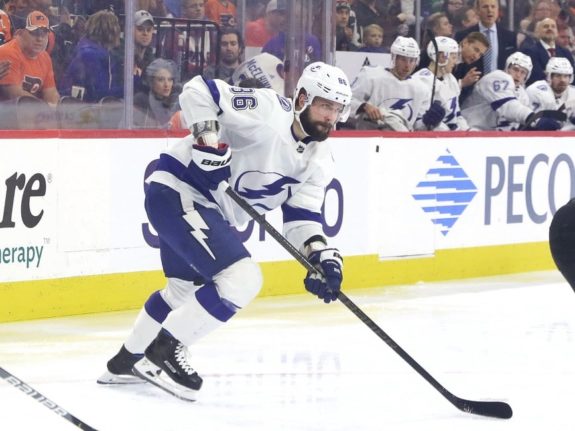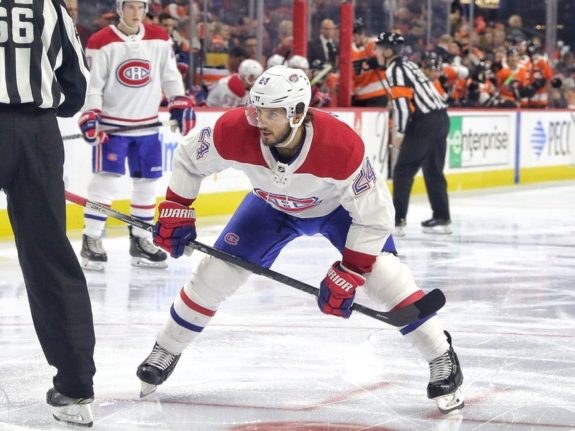The Montreal Canadiens extended their season Monday night via Josh Anderson’s dramatic Game 4 overtime winner. As a result, the series now stands at 3-1 in favor of the Tampa Bay Lightning, with Game 5 Wednesday night in Tampa. Despite the victory, the winning goal came largely against the flow of the play as the Lightning looked poised to eliminate the final barrier to their second straight championship.
Ultimately for the Canadiens, their penalty kills coupled with timely goals stymied their opponents and extended this Stanley Cup Final series. In a series where the Canadiens appear (for the most part) overmatched at five-on-five, they will need to continue to win the special teams battle to give themselves an opportunity to extend the series beyond Game 5, specifically on the penalty kill, where they have been able to build momentum throughout the playoffs.
Penalty Kill Adjustments
The Canadiens have made adjustments to their penalty kill as this series has gone on, and those changes are beginning to make a difference. When the Lightning are able to gain the zone, the Canadiens have formed a much tighter box closer to their net in an attempt to limit Nikita Kucherov from feeding Brayden Point in the bumper position. In addition, the tight-knit box limits passes between Kucherov and Steven Stamkos, thus eliminating cross-seam one-timers.

Nikita Kucherov, Tampa Bay Lightning (Amy Irvin / The Hockey Writers)
However, this strategy leaves optimal space for Victor Hedman at the point. The Canadiens seem more content to allow Hedman to set up Kucherov or Stamkos for one-timers from either side. The thinking here must be that Price does not have to move as far laterally, and so trust has been placed in him to save those shots, as lethal as they can still be. This strategy was vital to defining Game 4 and extending the series.
Game 4
Most notably, the oddity of sports shone through in Game 4 as the apparent turning point occurred with a minute left in regulation time. Canadiens captain Shea Weber took an unfortunate double-minor high-sticking penalty on Ondrej Palat, signaling what many believed to be a death knell for the team.
However, internally, coach Dominique Ducharme believed confidently that the team would kill the penalty, stating post-game that he told his players, “We have a big kill and we’re going to kill it, we’re going to go after it, and we’re going to win the game.” In addition, Phillip Danault, perhaps highlighting the obvious, added about the impact of the four-minute kill, “It was the biggest kill so far.” In any case, the kill gave the Canadiens some positive momentum and led to another overtime victory, their sixth of the playoffs.

Phillip Danault, Montreal Canadiens (Amy Irvin / The Hockey Writers)
Officially, Game 4’s stat line states the Lightning went 0-5 on the power play (as opposed to 0-1 for the Canadiens), which is, for them, quite out of the ordinary. Coming into the series, pundits and fans alike understood the impact special teams would have. Tampa Bay’s power play was hovering close to 38 percent (an insane level of success), while the Habs penalty kill was running at close to 93 percent efficiency. Since the series has begun, the stats for both teams have declined slightly, with the Lightning power play now at 33.9 percent and the Canadiens penalty kill at 91.4 percent. To some degree, this is one area where the Habs are succeeding.
Latest Canadiens Content:
- 3 Most Probable Teams to Sign Anton Stralman
- Michael Matheson: Get To Know the Canadiens’ Newest Acquisition
- NHL Rumors: Devils, Flames, Jets, Canadiens
- Pierre-Luc Dubois Has Jets & Cheveldayoff in a Bind
- Canadiens News and Rumours: Petry, Dubois, Pitlick & More
By and large, though, special teams did not play a large role in Games 1-3, with only 13 power plays total given to both teams and only three goals scored combined. Instead, Montreal turnovers emerged as the focal point. However, in Game 4, special teams defined the game, giving life to a team on the verge of elimination. In a series that has not gone well for the Canadiens overall, success on the penalty kill has allowed them to build some confidence for Game 5.
Moving Forward
First and foremost, the Canadiens should avoid taking penalties at all. No one would argue that. In fact, there is no question the Lightning will look to make their own adjustments as they know their power play can be a key to their success. In any case, if Montreal does take penalties, they need to be very aggressive up ice and continue to form the tight box when in their own zone. Continuing to be successful on the penalty kill may begin to frustrate Tampa Bay and help the Habs push the series back to Montreal.